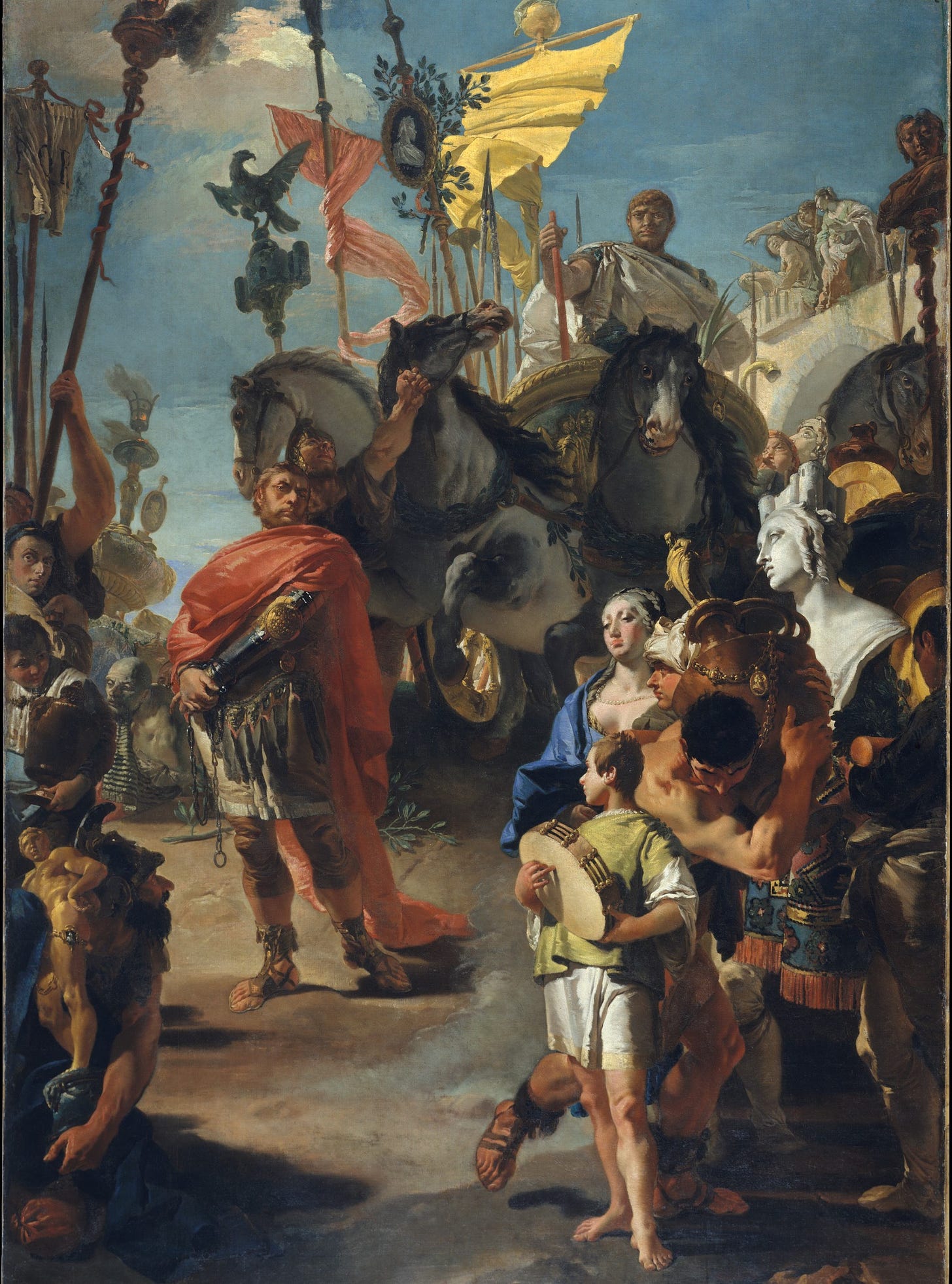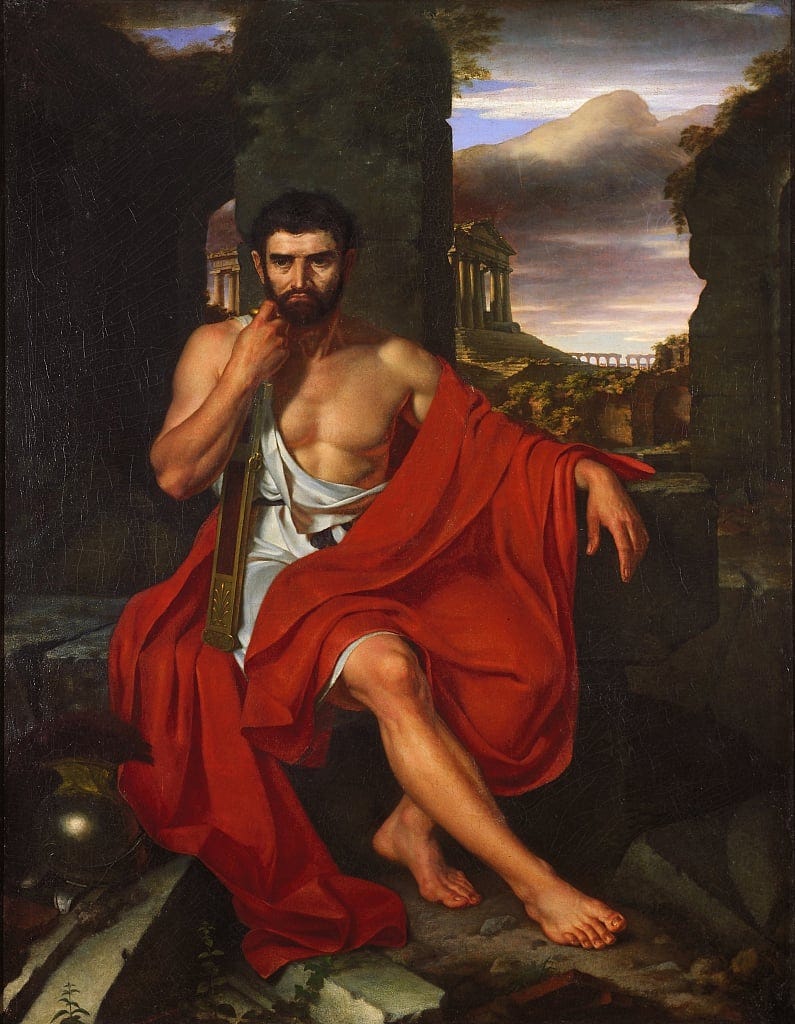Dear Classical Wisdom Reader,
I recently got the chance to re-watch The Banshees of Inisherin.
I don’t know if you’ve got the chance to see it, but it’s a great film about two friends who, well, stop being friends.
There was a lot of fuss made here in Ireland about how it functions as a metaphor for the Irish Civil War, but I think it works better in the broader sense: as a metaphor for any civil war.
Now when it comes to the Classical world, civil war is the ghost that haunts Roman history.
The Romans themselves knew it: it’s fitting that their great origin myth (or at least, one of their great origin myths) was Romulus and Remus, the story of a brother killing a brother.
Indeed, the poet Horace once wrote of the conflicts following Julius Caesar’s assassination:
‘Bitter fate pursues the Romans, and the crime of a brother’s murder, ever since the blood of blameless Remus was spilt onto the ground to be a curse on his descendants.’
Long after the tale of the twins was first told, but before Julius Caesar’s death, competing generals Marius and Sulla brought the Roman Republic to its knees with their brutal conflicts, in the first (but not last) large scale Roman civil war.
Today’s article looks at both the beginning and end of things: Marius’ (comparatively) humble origins, his unconventional strategies, soaring political career, and ultimately his devastating conflicts with Sulla.
So, I suppose the question now is… whose side would you have been on?
All the best,
Sean Kelly
Managing Editor
Classical Wisdom
Gaius Marius and the Fall of the Republic
By Benjamin J. Shehadi
He was one of the most important figures in all of ancient Roman history, rivaling even Julius Caesar or Cicero.
An outsider by birth, he ascended the ranks of Rome’s upper-class society. He held the consulship for an unprecedented seven times. Yet the unbounded ambition of this larger- than-life Roman general ultimately led to the Republic’s downfall.
So who was Gaius Marius?
Humble origins
Marius started out in an equestrian family which, despite relative affluence, remained outside of Rome’s snobbish aristocracy. He married into a rich family, which gave him the political patronage he needed to become a tribune in 119 BC and a praetor in 115 BC. Serving as a governor in one of Rome’s Spanish provinces, Marius gained priceless military experience from his counter-insurgency campaigns against Rome’s tribal enemies. Carefully and meticulously, the Roman governor studied the hit-and-run tactics of his foes, allowing him to master the art of conquest.
Marius further distinguished himself by serving as a junior military officer in the Jugurthine War in 109 BC. Exploiting his military prestige, the unorthodox Marius broke from tradition by running for the consulship in 107 BC. To bolster his electoral prospects, Marius presented himself as a true man of the people. He styled himself as a populist, whose personal competence and merit outshone the arbitrary privileges of Rome’s archaic aristocracy. “They may look down on my humble origins,” the gruff general remarked of Rome’s aristocrats, “but I have nothing but disdain for their idleness.”
Marius’ electioneering was successful. Earning the acclaim of Rome’s populace, he was awarded military command by the tribunes. This marked a turning point in Roman politics because, for the first time, the popular assembly was getting directly involved in foreign policy. The populism of Marius was an outrage to Rome’s aristocrats, who tried to blunt his meteoric rise to power. The Senate even refused to supply him with troops. To circumvent the elites, General Marius began to recruit ordinary Roman citizens as his soldiers. Now, anyone could serve in Rome’s armed forces, regardless of their personal wealth or nobility. Under Marius, Roman troops were no longer dependent on the aristocratic Senate. Instead, soldiers relied on the personal patronage of their military commanders.
It was a move that dramatically undermined Rome’s traditional government. Having restructured Rome’s military, Marius seized command of the Jugurthine War. After training his new recruits, he began to gain the upper hand against the Numidian monarch. Keeping in touch with his humble roots, the populist Marius was well-beloved by his troops. He personally shared in their hardships, and refused the luxuries of his high office. He slept in the same tents, and engaged in the same hard labor. Yet even with Marius’ reforms, the Romans did not win the war by openly defeating King Jugurtha.
The Romans prevailed because of behind-the-scenes diplomacy by one of Marius’ subordinates, a junior officer named Sulla. Marius grew jealous of Sulla’s popularity, and the two would later fight in a brutal civil war. But for the time being, Marius still managed to win re-election as Rome’s consul.
Emergency powers
For a long time, Rome’s northern border had been highly stable. It had not been attacked since the Gallic Sack of Rome in 390 BC. Yet German invaders managed to defeat Rome’s consular armies several times in the early 100s BC. The Senate nervously summoned reinforcements to quell the German threat. Nothing seemed to work and, in 105 BC, the Romans suffered their worst defeat since Hannibal at the ill-fated Battle of Arausio.
Now in panic, the Romans turned to Marius to defeat the German menace. Amid this emergency, Marius was re-elected as consul for five years in a row. In 102 BC, the Germans were invading Italy from all sides. Marius’ army moved against the Teutones in Gaul, drying them of their supplies through a war of attrition. His cautious tactics were criticized, even among his men. Yet Marius assured the Romans that he was waiting for the right time to strike.
Finally, near the town of Aquae Sextiae, he sent 3,000 men for a surprise ambush. He led it personally, which was highly unusual. Marius led a final, decisive engagement against the Germans at the Battle of Vercellae in 101 BC. It was yet another victory, and the Germans were again routed. Having defeated the Germans, Marius was hailed as Rome’s savior. Upon returning to Rome, he was again elected as consul for the sixth time.
Yet the overconfident general overstepped his boundaries, and seized dictatorial powers. In so doing, Marius hollowed out the vestiges of Rome’s republican constitution, which had previously prevented the rule of a single dictator or ruler. Marius aligned himself with a tribune named Saturnius, who introduced a majesty law, which criminalized certain forms of speech. The unpopular law was detested by the Senate and the Roman populace alike. The public hated it, and riots broke out in the streets. To restore order, the Senate reluctantly authorized Marius to unleash his professional soldiers on the Roman people. It was yet another turning point in Rome’s history. Never before had a Roman used the armed forces against a fellow Roman. The disgraced Marius was deeply hated, and he abruptly left Rome in 98 BC.
Rise of Sulla
While Marius was away from Rome in the 90s BC, Sulla and his allies seized control of Rome’s government. Sulla represented Rome’s aristocrats, who deeply resented the revolutionary changes made by Marius to the Republic. For example, they refused to extend Roman citizenship to the other Italian peoples. Those disaffected Italians were largely concentrated in the southern and central parts of the peninsula, along the Adriatic Sea. Angry, they rose up in armed rebellion against the Roman government. These Italians formed their own rival government, with its own senate and capital city. The new nation was called Italia, symbolized with a lion. Rome fought against its Italian allies, in a conflict known as the Social War.
It was a particularly bloody war, with both sides being well-versed in Roman military tactics. Sulla was able to bolster his domestic popularity by waging war against the Latins, eventually defeating the enemy by 88 BC. Yet even after this protracted and brutal conflict, the Romans ended up extending citizenship to the other Italians anyway. It was the very definition of a useless and unnecessary war. Worse still for the Romans, it set the dangerous precedent of using civil war to resolve internal political disputes.
Upon winning the Social War, Sulla became Rome’s consul in 88 BC. Unlike Marius, Sulla came from an aristocratic background. Although he frequented the company of lower-class dancers and actors, Sulla was determined to restore the wealth and privilege of his noble family. Sulla’s ego clashed with that of Marius, setting the stage for civil war in Rome. Marius still enjoyed a greater reputation, so Sulla needed to find his own military glory.
Sulla fought against King Mithridates VI of Pontus, near the Black Sea. The Greek king wanted to become the next Alexander the Great, and his territorial ambitions brought him into conflict with Rome. Under Mithridates, the Kingdom of Pontus swept across Rome’s eastern Greek-speaking provinces, including mainland Greece and Macedonia. Rome seemed to be crumbling. The Senate summoned a massive army to confront the Hellenistic king. Conflict arose over who would receive this prestigious command. Marius cited his victories against the Germans, and coveted the position. So did Sulla, who enjoyed the Senate’s favor. A tribune, backed by Marius, stripped the command from Sulla. Riots broke out, and Sulla fled. But now, Sulla took things to a new level.
Having raised six legions to fight the Greeks, Sulla repurposed his armed forces for an unprecedented march on Rome itself. It was so unexpected, that there was no organized opposition. Marital law was declared, and Marius’ supporters were outlawed. Marius fled to North Africa, leaving Sulla as Rome’s sole master. Having usurped power, the dictator Sulla began to enact reforms to restore the Senate’s traditional privileges at the expense of the tribunes. After doing so, Sulla marched his army eastward to wage another unnecessary war against Mithridates. But in Sulla’s absence, Rome underwent another regime change. This time, it was Cinna, an ally of Marius, who came to power. This allowed Marius to return to Rome with a vengeance. Sulla’s supporters were summarily executed, and their property confiscated. Marius had himself appointed in 86 BC as consul for the seventh time. But the 70-year-old Marius died of natural causes, only 17 days in office.
Death of the Republic
Marius and Sulla were just the first in a series of competing warlords in the Late Republic. But who was worse? Whatever one’s judgement, most modern scholars agree that the civil wars between Sulla and Marius disrupted the Republic’s equilibrium between the Senate, the magistrates, and the Roman people. Rome could no longer accommodate the grandiose ambitions of its military generals. The Republic was over.
This article was written by Benjamin J. Shehadi of Hot History.







Marius was the better of the two, in my view. But the Republic's real downfall was to replace the traditional "citizen-soldier" with an imperialist professional standing army. Although Sulla's grave has the best sentence ever spoken by Roman lips: "No friend ever served me, and no enemy ever wronged me, whom I have not repaid in full."
One wonders just how much human ingenuity and creativity is squandered in useless wars. And, the inanity continues.